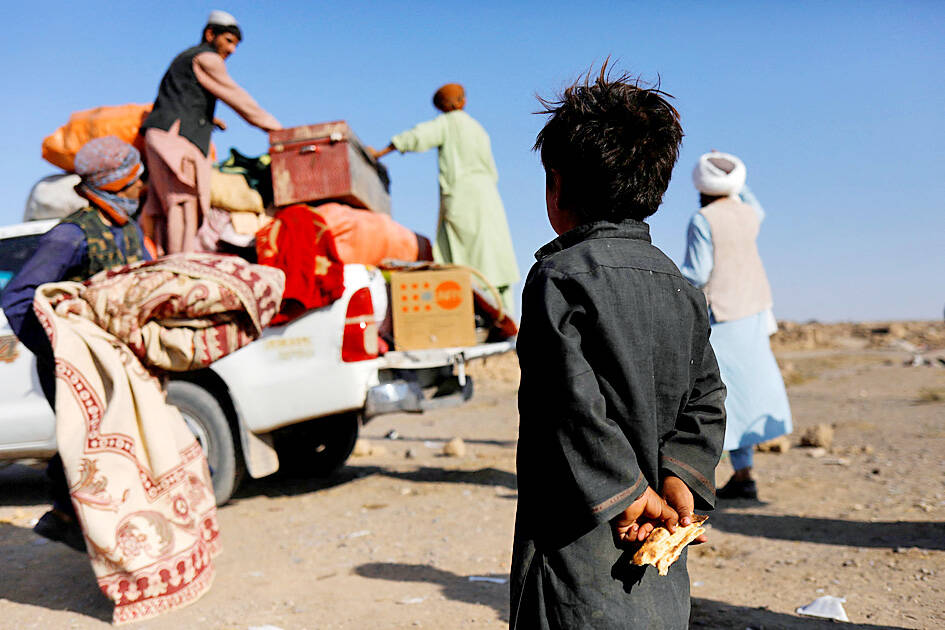Another strong earthquake yesterday morning shook western Afghanistan after deadly quakes on Saturday flattened whole villages in Herat Province, as officials yesterday significantly lowered the death toll from the weekend temblors to about 1,000.
The magnitude 6.3 earthquake yesterday was about 28km outside Herat, the provincial capital, and 10km deep, the US Geological Survey said.
It triggered a landslide that blocked the main Herat-Torghondi highway, Afghan Ministry of Information and Culture spokesman Abdul Wahid Rayan said.

Photo: Reuters
The aid group Doctors Without Borders said the Herat regional hospital received 117 injured from yesterday’s quake, adding that it was setting up four more medical tents at the facility.
“Our teams are assisting in triaging emergency cases and managing stabilized patients admitted in the medical tents,” it wrote on X, formerly known as Twitter.
The epicenter of Saturday’s quake — also of the same magnitude 6.3 — was about 40km northwest of the provincial capital, and several aftershocks have been strong.
The Taliban government had originally said that more than 2,000 people had been killed in that earthquake, but Afghan Minister of Public Health Qalandar Ebad yesterday lowered the toll to about 1,000, attributing the confusion to the remoteness of the area and double reporting by agencies involved in the rescue effort.
“We have over 1,000 people martyred from the first incident,” Ebad told reporters in Kabul.
Yesterday’s quake also flattened all 700 homes in Chahak village, which was untouched by the tremors of previous days. Now there are mounds of soil where dwellings used to be, but no deaths have been reported so far in Chahak because people have taken shelter in tents this week, fearing for their lives as tremors continue to rock Herat.
Some residents said they had never seen an earthquake before and wondered when the shaking of the ground would stop.
Many said they have no peace of mind inside the tents for fears the “ground will open and swallow us at any moment.”
Besides rubble and funerals after Saturday’s devastation, there is little left of the villages in the region’s dusty hills. Survivors are struggling to come to terms with the loss of multiple family members and in many places, living residents are outnumbered by volunteers who had come to search the debris and dig mass graves.
In Naib Rafi, a village that previously had about 2,500 residents, people said that almost no one was still alive besides men who were working outside when the quake struck. Survivors worked all day with excavators to dig long trenches for mass burials.
On a barren field in the district of Zinda Jan, a bulldozer removed mounds of earth to clear space for a long row of graves.
“It is very difficult to find a family member from a destroyed house and a few minutes to later bury him or her in a nearby grave, again under the ground,” said Mir Agha, who is from Herat and had joined hundreds of volunteers to help the locals.
Additional reporting by AFP

REVENGE: Trump said he had the support of the Syrian government for the strikes, which took place in response to an Islamic State attack on US soldiers last week The US launched large-scale airstrikes on more than 70 targets across Syria, the Pentagon said on Friday, fulfilling US President Donald Trump’s vow to strike back after the killing of two US soldiers. “This is not the beginning of a war — it is a declaration of vengeance,” US Secretary of Defense Pete Hegseth wrote on social media. “Today, we hunted and we killed our enemies. Lots of them. And we will continue.” The US Central Command said that fighter jets, attack helicopters and artillery targeted ISIS infrastructure and weapon sites. “All terrorists who are evil enough to attack Americans are hereby warned

Seven wild Asiatic elephants were killed and a calf was injured when a high-speed passenger train collided with a herd crossing the tracks in India’s northeastern state of Assam early yesterday, local authorities said. The train driver spotted the herd of about 100 elephants and used the emergency brakes, but the train still hit some of the animals, Indian Railways spokesman Kapinjal Kishore Sharma told reporters. Five train coaches and the engine derailed following the impact, but there were no human casualties, Sharma said. Veterinarians carried out autopsies on the dead elephants, which were to be buried later in the day. The accident site

RUSHED: The US pushed for the October deal to be ready for a ceremony with Trump, but sometimes it takes time to create an agreement that can hold, a Thai official said Defense officials from Thailand and Cambodia are to meet tomorrow to discuss the possibility of resuming a ceasefire between the two countries, Thailand’s top diplomat said yesterday, as border fighting entered a third week. A ceasefire agreement in October was rushed to ensure it could be witnessed by US President Donald Trump and lacked sufficient details to ensure the deal to end the armed conflict would hold, Thai Minister of Foreign Affairs Sihasak Phuangketkeow said after an ASEAN foreign ministers’ meeting in Kuala Lumpur. The two countries agreed to hold talks using their General Border Committee, an established bilateral mechanism, with Thailand

‘POLITICAL LOYALTY’: The move breaks with decades of precedent among US administrations, which have tended to leave career ambassadors in their posts US President Donald Trump’s administration has ordered dozens of US ambassadors to step down, people familiar with the matter said, a precedent-breaking recall that would leave embassies abroad without US Senate-confirmed leadership. The envoys, career diplomats who were almost all named to their jobs under former US president Joe Biden, were told over the phone in the past few days they needed to depart in the next few weeks, the people said. They would not be fired, but finding new roles would be a challenge given that many are far along in their careers and opportunities for senior diplomats can